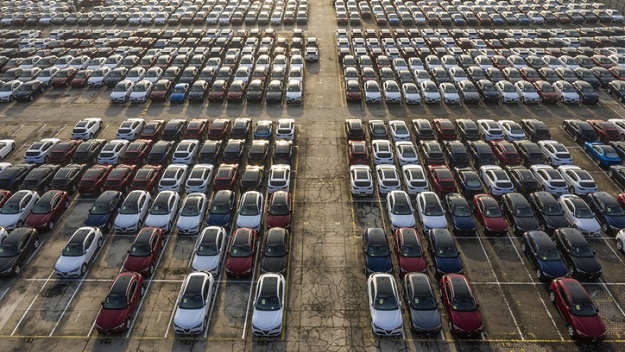
Lockdowns have been instituted in countries across the world, limiting the movement of people, and raising the question of the future of motor vehicles. Individuals may not be driving much for now, but when lockdown restrictions lift, they will find reasons to move around again. The need for transport will remain, but the need to own cars might not, a futurist suggests.
The next question is how might people choose to move around? Public transport, bicycles and ride-shares are all in the mix.
For now, the situation for motor vehicles looks dire. In April, new vehicle sales dropped 98.4% with only 574 units being sold. By comparison, 36 787 vehicles were sold in April 2019. Similarly, exports fell 97.3%, with only 901 units leaving the docks, compared to 31 928 units reported for the same month last year.
South Africa is not unique. The UK's car sales for April plunged 97% to its lowest monthly level since 1946.
Moody's has also downgraded several auto manufacturers and placed others on review, on projections that demand for manufactured vehicles will fall by 13.5 million in 2020.
Deloitte managing director of emerging markets and Africa, Dr Martyn Davies, expects vehicle sales to drop by 25% for 2020. This is coming off the back of an industry which was already facing poor demand in a weak economy. According to Deloitte, following the global financial crisis in 2008, automotive demand declined 8% over two years.
This is concerning, given that South Africa's automotive manufacturing industry contribute 6.9% of GDP growth and accounts for 30.1 % of the country's manufacturing output. The manufacturing industry came to a standstill during April as a result of the national lockdown.
CEO of the National Association of Automobile Manufacturers of South Africa, Michael Mabasa, believes that automotive component production will gradually come back online, under strict risk-adjusted measures to support the country's response to the Covid-19 pandemic. But the industry is "under no illusion" that it will be a difficult year ahead. There are, however, hopes that the interest rate cut in April would help buoy indebted consumers and businesses and lower fuel prices could restart industry sales.
Nedbank, however, expects fixed investment spending to fall by almost 15% in 2020, and this will negatively impact sales of commercial vehicles. The car rental industry is also expected to take a knock due to falling business and leisure travel. The rand's depreciation might also push vehicle prices up.
Export volumes will likely be curtailed by lower domestic production, and lower demand from SA's major trading partners, Europe and Asia, according to Nedbank.
But don't write off motor vehicles just yet.
Dr Morné Mostert, director of the Institute for Futures Research at Stellenbosch University, is of the view that people will continue to buy cars, but their transport alternatives will also increase. For example, the internal combustion engine which led to modern modes of transport did not render the bicycle redundant.
"I think it is in their (humans') nature to be explorers and so transport, the need for transport, will not disappear. We want to move around. That need to explore might be something that the automotive industry will have to connect with, if it wants to be competitive over the next few decades," said Mostert.
Mostert noted that the vehicle industry may be under pressure, and that the Covid-19 pandemic may be increasing the pressure. But people do not buy cars for transport only, he said. Car purchases are an emotional decision and manufacturers will "exaggerate" these emotional reasons to draw future car purchases. Mostert used the example of how Harley Davidson motorcycles sell the idea of freedom.
Driverless cars and the shared ownership of vehicles will definitely be among the future trends of the industry, said Mostert.
Transport economist Ofentse Mokwena is of the view that the deregulation of the meter-taxi industry so that they can operate in the same way as e-hailing services will likely be seen domestically. Shuttle services for staff might rise, boosting the sales of medium or midi-taxis too.
Bicycle culture
Secondly, bicycle-sharing or scooter sharing could be seen in the medium to long term, especially in denser cities like university towns.
"The bicycle economy is a huge employment opportunity and skills opportunity," said Mokwena. He highlighted the opportunities for using bicycles for even transporting cargo, and that it would create new services such as deliveries.
Davies also thinks that the scooter and bicycle culture in SA is yet to be developed. "What's quite unique in South Africa, people go from taxis and aspire towards car ownership, and that's it," Davies said. Most developing countries go through various phases, where people move from bicycles, to scooters to cars, he explained.
"There are massive mobility gaps, the question is how to fill those gaps on public sector provision and private sector commercial undertaking," he said. "We do not seem to be cultured in SA in driving bicycles or driving scooters. I don’t know why that should not be the case?" Efficiency in the public transport sector is another gap which should be addressed, Davies highlighted.
Low carbon economy
The oil price crash, brought on by low demand as a result of lockdowns nearly halting economic activity entirely will also be a factor influencing the future automotive industry.
In the developed world, the automotive industry is moving towards electric engines. Davies expects that in the next 20 years there will be a rapid shift towards non-combustion engines. Vehicles will be powered by hydrogen or electric engines and even hybrids.
Mokwena believes discussions on climate change are also gaining momentum and will add pressure for change towards a low carbon economy. In South Africa, when it comes to electric vehicle manufacturing, the question is whether manufacturers will be incentivised by government to make the move. "Policy certainty influences and determines investment," he said.
Mostert believes South Africa has a short window of opportunity to incentivise a green economy. "[In South Africa], our issue is such that social inequality and economic equality has taken priority over our relationship with nature," Mostert said. While the president has said the economy will transition to being more climate conscious, the pace of this transition is not clear. The pandemic could accelerate change, but will not be able to do so alone. "We need bold leadership from government. The truth is, I suspect they have other issues to worry about," said Mostert.




 Publications
Publications
 Partners
Partners











